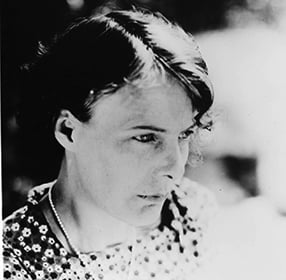Projector
Light takes new attribute
and yet his old
glory
enchants;
not this,
not this, they say,
lord as he was of the hieratic dance,
of poetry
and majesty
and pomp,
master of shrines and gateways
and of doors,
of markets
and the cross-road
and the street;
not this,
they say;
but we say otherwise
and greet
light
in new attribute,
insidious fire;
light reasserts
his power
reclaims the lost;
in a new blaze of splendour
calls the host
to reassemble
and to readjust
all severings
and differings of thought,
all strife and strident bickering
and rest;
O fair and blest,
he strides forth young and pitiful and strong,
a king of blazing splendour and of gold,
and all the evil
and the tyrannous wrong
that beauty suffered
finds its champion,
light
who is god
and song.
He left the place they built him
and the halls,
he strode so simply forth,
they knew him not;
no man deceived him,
no,
nor ever will,
with meagre counterfeit
of ancient rite,
he knows all hearts
and all imagining
of plot
and counterplot
and mimicry,
this measuring of beauty with a rod,
no formula
could hold him
and no threat
recall him
who is god.
Yet he returns,
O unrecorded grace,
over
and under
and through us
and about;
the stage is set now
for his mighty rays;
light,
light that batters gloom,
the Pythian
lifts up a fair head
in a lowly place,
he shows his splendour
in a little room;
he says to us,
be glad
and laugh,
be gay;
I have returned
though in an evil day
you crouched despairingly
who had no shrine;
we had no temple and no temple fire
for all these said
and mouthed
and said again;
beauty is an endighter
and is power
of city
and of soldiery
and might,
beauty is city
and the state
and dour duty,
beauty is this and this and this dull thing,
forgetting who was king.
Yet still he moves
alert,
invidious,
this serpent creeping
and this shaft of light,
his arrows slay
and still his footsteps
dart
gold
in the market-place;
vision returns
and with new vision
fresh
hope
to the impotent;
tired feet that never knew a hill-slope
tread
fabulous mountain sides;
worn
dusty feet
sink in soft drift of pine
needles
and anodyne
of balm and fir and myrtle-trees
and cones
drift across weary brows
and the sea-foam
marks the sea-path
where no sea ever comes;
islands arise where never islands were,
crowned with the sacred palm
or odorous cedar;
waves sparkle and delight
the weary eyes
that never saw the sun fall in the sea
nor the bright Pleaiads rise.
This poem is in the public domain. Published in Poem-a-Day on January 28, 2024, by the Academy of American Poets.
“Projector” appears in Close Up, vol. 1, no.1 (July 1927), accompanied by H.D.’s essay “The Cinema and the Classics.” In “The Concept of Projection: H.D.’s Visionary Powers,” published in Contemporary Literature, vol. 25, no. 4 (Winter 1984), Adalaide Morris, professor of English and chair of the English department at the University of Iowa, writes, “‘Projector’ [. . .] names the Delphian Apollo as god of the cinema and envisions him reasserting his domain on a ray of image-bearing, world-creating light [. . .]. H.D.’s ecstatic poem greets Apollo as he begins his miracles. The poem’s clipped, incantatory lines and detailed invocation of the Delphic paradigm, however, suggest something more than simple salutation. H.D.’s advocacy asserts a place and function for herself. Apollo at Delphi works through his oracle, the Pythoness, who is a medium between the god and the seeker [. . .]. As the transmitter of the prophetic message, her position precedes and predicts H.D.’s. Who, then, is the poem’s ‘Projector’? It is Apollo, light-bearer; it is his Delphic oracle; it is H.D. herself, the projector-poet; and perhaps it is also the machine in her apartment [a small projector] which, in a coincidence that doubtless delighted H.D., rested, like the Pythoness herself, upon a tripod—symbol of prophecy, prophetic utterance, occult or hidden knowledge.” A sequel to the poem, “Projector II (Chang),” was later published in Close Up, vol. 1, no. 4 (October 1927).

